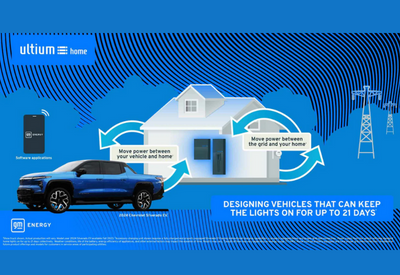More Auto Makers Jump Into the Home Energy Business


October 23, 2022
Several months ago, Ford Motor Company made news with its EV version of the F-150 Lightning truck featuring a Home Integration System that can reportedly keep the lights and appliances on in a home during power outages for up to three days on its own, or up to 10 days when used in conjunction with solar power. Ford has also partnered with national home builders (i.e. Pulte, Lennar, Meritage) and nationwide solar energy provider Sunrun to expand its home integration plans.
Almost immediately after Ford’s unveiling of the EV Ford-150 Lightning in spring, the truck sold out in all 50 states for 2022 — and even two price hikes for the 2023 models (one in August and one this month) haven’t stopped demand. According to Car and Driver, Ford recently announced the official pricing figures for the 2023 Lightning: the Pro starts at $53,769, with the Platinum trim selling for $98,669; and the basic XLT is listed at $61,269, with the Extended Range version reaching $82,769; the Lariat now costs $76,269, and the Lariat Extended Range is priced at $87,769.
Despite the on-going inflation increases and talk of an upcoming Recession, consumers are still willing to dig deep into their pockets for EV vehicles offering electric power capabilities for their homes.
Last week, GM announced its new entity under the name GM Energy, which includes Ultium Home, Ultium Commercial, and Ultium Charge 360, with the goal of expanding business opportunities to include energy management services and “drive growth beyond the core vehicle portfolio.”
Just as Ford partnered with Sunrun as a solar energy provider, GM is collaborating with SunPower. GM Energy’s connected product and service offerings are designed to offer cohesive energy management for home, commercial, and EV customers with solutions ranging from bi-directional charging, vehicle-to-home (V2H) and vehicle-to-grid (V2G) applications, to stationary storage, solar products, software applications, cloud management tools, microgrid solutions, and hydrogen fuel cells. GM Energy’s services will also enable the sale of energy from EV and stationary storage batteries back to utilities during peak, high energy consumption periods, unlocking even more potential value for customers and increasing resiliency for the electrical grid.
“The reliability of the U.S. electrical power grid has never been more important,” said Travis Hester, VP/GM EV Growth Operations. “GM Energy has the opportunity to help deliver sustainable energy products and services that can help mitigate the effect of power outages and provide customers with resilient and cost-effective energy management.”
The central interface for GM Energy’s solutions will be GM’s Energy Services Cloud, which will house data and energy management tools, connecting customers seamlessly with residential, fleet, and commercial energy assets. Customers will be able to manage their energy consumption simply and efficiently through GM’s energy software applications. GM has already enrolled EV customers in managed charging programs through the Energy Services Cloud, with multiple utilities across four U.S. states and growing.
Several large-scale companies across the U.S. have already agreed to work with GM Energy to provide energy solutions to customers and receive product/service offerings. With SunPower, the two companies will develop and offer customers a home energy system which will consist of integrated EV and battery solutions, solar panels, and home energy storage. A primary feature of the home energy system is expected to enable drivers to deliver power to their homes with the battery in their compatible electric vehicle, designed to give them the ability to power their home’s necessities in a blackout or draw from stored energy during peak rate times. SunPower will also become a preferred installer for the home energy system and offer customers the opportunity to add solar to their home. The home energy system will be available alongside the retail launch of the 2024 Chevrolet Silverado EV, expected to begin production in fall 2023.
Another initiative includes a V2H pilot project between GM Energy and Pacific Gas and Electric Company (PG&E) planned to enable residential customers to use their compatible EVs along with a bi-directional charger, as back-up power for essential home needs during short-term power outages. After initial lab tests, the two companies anticipate expanding the V2H offer to a subset of residential customers within PG&E’s service area, expected to begin in 2023.
GM Energy is also working with utility companies such as ConEdison, Graniterock, and New Hampshire Electric Cooperative (NHEC) to help deliver energy solutions to customers.
“GM Energy’s mission is to offer customers access to a full suite of energy products and services, including solutions beyond the vehicle, accelerating the seamless transition to an all-electric future,” Hester stated.
In December 2021, Volkswagen announced that it is exploring bi-directional charging for its EV cars in the future, but did not give specific target dates.
Tesla, a forerunner of the EV wave, currently does not offer bidirectional charging capability, but that may change in the future.
There is little doubt that bi-directional charging is a desirable amenity today in the face of soaring energy costs. The Inflation Reduction Act, signed into law in August and which includes $369 billion in climate investments, ensures that solar energy installations will also remain top-of-mind when planning residential and commercial projects going forward.








